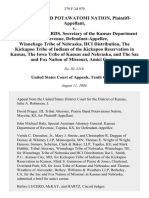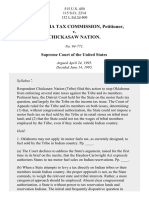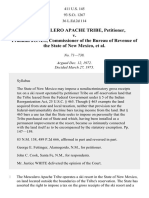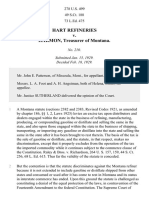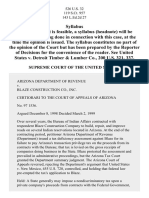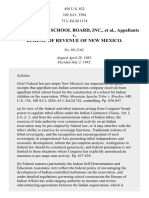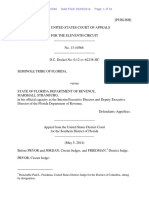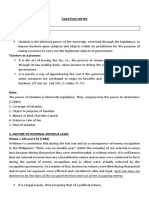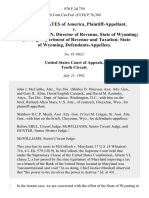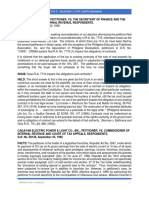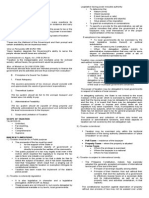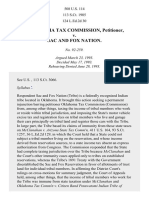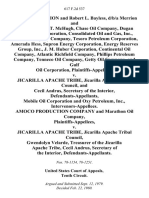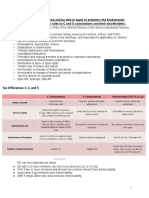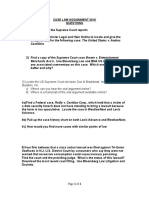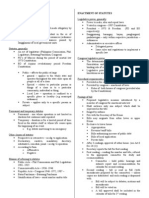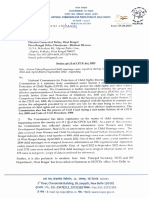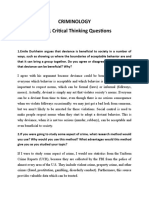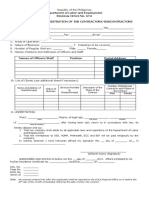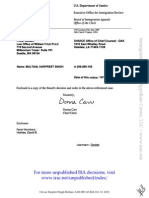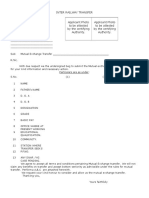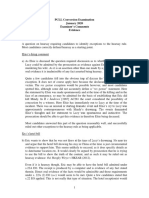“We’re Not in Kansas Anymore”: Wagnon v.
Prairie Band Potawatomi
Nation and the Quandaries of State Taxation in Indian Country
INTRODUCTION: Nearly ten years ago, Kansas sought to apply
its Motor Fuel Tax Act to Indian tribes for the first time,
touching off litigation that only recently concluded with the
United States Supreme Court’s decision in Wagnon v. Prairie Band
Potawatomi Nation. The Potawatomi tribe (“the Nation”)
maintained a gas station to support an on-reservation casino and
charged a tax on fuel sales. The Kansas tax, to be applied
concurrently, would effectively nullify the tribal tax because
simple economics dictated the two were mutually exclusive. The
Court interpreted the relevant statute literally, holding it put
the legal incidence of the tax on non-Indian distributors and
was applied to their first receipt of the fuel, a transaction
that occurred off-reservation. Applying these circumstances to
established law, the Court ruled Kansas was within its sovereign
authority to levy the tax. A dissent argued the incidence of
the tax applied to an on-reservation transaction and fell on
Indian retailers, and advocated the use of a balancing test.
BACKGROUND: For nearly 200 years, Supreme Court
adjudication surrounding tribal-state relations emphasized
concurrent sovereignty, preferring unilateral regulation of the
tribes by the federal government. However, Court decisions over
the last thirty-five years have gradually eroded tribal immunity
1
�from state regulation, occasionally upholding state taxes that
reach into jurisdictions that are historically Indian.
In certain circumstances the Court allowed states to levy
taxes directly on the tribes or their members. For example, a
New Mexico tax on the gross receipts a tribe earned from an off-
reservation business venture was upheld in Mescalero Apache
Tribe v. Jones. Similarly, in Oklahoma Tax Commission v.
Chickasaw Nation, a state tax on income earned by Indians who
lived off-reservation survived scrutiny. However, California v.
Cabazon Band of Mission Indians prohibited a state from
regulating on-reservation gaming ventures by Indian tribes.
Thus, tribal enterprises and individual members may be subject
to state taxation off the reservation, but are immune therein.
State attempts to tax non-Indians on the reservation proved
more contentious, and the resulting doctrine more opaque. In
general, states may impose taxes in these instances unless (1)
doing so would infringe on the right of Indians to make their
own laws, or (2) the state is preempted by Congress. In White
Mountain Apache Tribe v. Bracker, the Court stated explicit
statutory preemption is unnecessary. In that case, an Arizona
fuel tax was invalidated because a combination of federal and
tribal interests preempted its imposition. Incorporated into
this interest-balancing test was the previously separate notion
that states may not infringe on tribal autonomy.
2
� The Court continues to apply the Bracker test in cases
where states seek to tax non-Indian entities operating on tribal
lands. In Washington v. Confederated Tribes of the Colville
Indian Reservation, the Court upheld a state tax on cigarette
purchases by non-Indians at stores located on reservations.
Likewise, a state severance tax on oil drawn by a private
company from reservation land was validated in Cotton Petroleum
Corp. v. New Mexico.
Although the initial motor fuel tax statute was ambiguous,
Kansas altered it sometime in the late 1990s to explicitly place
the incidence on the distributor of first receipt. This appeared
to effectively clear up any misconceptions. In Kaul v. Kansas
Department of Revenue, the Kansas Supreme Court interpreted the
statute as placing the incidence of the tax on non-Indians, and
a federal district court agreed in Winnebago Tribe of Nebraska
v. Kline. But curiously, the Tenth Circuit came to a different
conclusion in Prairie Band Potawatomi Nation v. Richards,
finding federal and tribal interests preempt the tax regardless
of who bears its incidence. This misapplication required
clarification and, thus, the stage was set for Wagnon.
ANALYSIS: The Court’s opinion in Wagnon is premised on the
clarity of the Kansas state legislature’s assignment of the fuel
tax incidence in section 79-3408(c). It also refers to the
Kansas Supreme Court’s interpretation of the statute in Kaul.
3
�According to Justice Thomas, writing for the majority, because
the Nation does not bear the burden of the tax and because the
tax arises from an off-reservation transaction, it is valid.
In contesting the opinion, the Nation first argues that the
statute actually puts the incidence on Indian retailers. This
is because distributors may pass on the costs incurred by the
tax to retailers at the point of sale. But the Court points out
that distributors must calculate and physically pay the tax, and
are not required to pass on the tax. Alternatively, the Nation
argues the tax actually arises from the on-reservation delivery
of the fuel, which would trigger the Bracker test. In support of
this proposition, the Nation refers to sections 79-3408(a) and
79-3408(d) of the tax statute. Justice Thomas opts for a less
expansive interpretation of those provisions, and relies on
alternatives to distinguish the Nation’s assertion.
Although not essential to the holding, the remainder of the
opinion attempts to clarify the instances in which the
application of the interest-balancing test is appropriate. Three
points are important: (1) the state does not infringe on tribal
sovereignty when, as here, the tax falls on a transaction
occurring off the reservation; (2) the balancing test should not
be applied simply because the state tax interferes with the
tribe’s own ability to tax; and (3) the Nation is not a
territory exempted from the tax by statute.
4
� In dissent, Justice Ginsburg argues for the imposition of
the interest-balancing test. She points out that the taxes are
mutually exclusive—although legally both the tribe and the state
may tax the motor fuel, economic reality dictates that the two
taxes together would raise the market price far above the
competition. Thus, if the tax is upheld the incidence will
ultimately fall on the tribe, since it will have to forego the
tax revenue it had previously enjoyed and depended upon to
maintain reservation roads. Accordingly, the tribe can
demonstrate a compelling interest in avoiding the tax, and
Justice Ginsburg argues it should be invalidated.
EVALUATION: The Court’s opinion correctly interprets the
incidence of the motor fuel tax and then applies the appropriate
case law. The best way to demonstrate this is by comparing
alternative treatments of the two overarching issues in Wagnon:
(1) who bears the incidence of the tax, and (2) where
geographically is the tax assessed? If the tax is born by
Indians for sales made on the reservation, it is categorically
barred. If the tax is imposed on non-Indians but occurs on the
reservation, the Bracker test should be applied. If the tax is
born by non-Indians and assessed off-reservation, as the Court
rules, it is valid.
Assessing the first alternative, the tax is not
categorically barred because the incidence does not fall on the
5
�Nation. (Although the dissent advocates for affirming the
Richards decision to the contrary.) It is certainly true that
the state tax will affect the Nation by negating its ability to
levy its own motor vehicle tax. However, both Justice Ginsburg
and the Tenth Circuit make a logical misstep by equating the
tax’s effect on the Nation with the tax’s imposition on the
Nation. The two are simply not the same, certainly not enough
to allow the Nation to overcome explicit language to the
contrary from section 79-3408(c).
Regarding the second alternative, the Bracker test is not
appropriate because, although the incidence of the tax is on the
non-Indian distributor, it does not arise out of an on-
reservation transaction. The dissent argues the tax is imposed
on the on-reservation fuel sale from distributor to retailer,
based on section 79-3408(d) of the statute, which states the
“who” and “where” of the fuel sale are the criteria for
determining which transactions are tax exempt. As a corollary,
Justice Ginsburg suggests they must also be the criteria for
determining which transactions are taxed. This is a complete
misreading of the statute: section 79-3408(d) denotes when the
tax is not imposed; it is section 79-3408(c) that states the
method in which the tax is imposed. Section 79-3408(d) cannot be
read backward to imply what transactions trigger the tax, and it
need not be: section 79-3408(c) states them explicitly.
6
� Even if the Court were to decide the incidence of the tax
occurs on the reservation and applied the Bracker test, it is
not clear the result would be any more favorable for the Nation.
First, both the state and the tribe have an interest in
maintaining the sovereign authority to tax. A finding against
Kansas would prohibit its ability to tax the sale of motor fuel
to distributors in situations where distributors might pass that
tax down to Indian retailers. Alternatively, a finding against
the Nation does not prohibit its ability to tax fuel at all. The
tribe retains the power to levy its own tax concurrent with that
of the state; it simply complains it cannot.
Second, both the state and the tribe have an interest in
obtaining tax revenue. While a finding against Kansas appears
more palatable, especially since the state apparently does not
use the revenue it receives from the motor fuel tax to maintain
the majority of reservation roads, there are a number of
problems with this conclusion. First, it relies on the
assumption that the state tax must be proportional to services
provided by the state, which is not consistent with precedent.
Second, it ignores the fact that Kansas applies a general tax,
the proceeds of which go to finance state projects, some of
which surely benefit the Nation. Finally, it suggests the
Nation will be unable to procure alternative means of finance.
From a policy standpoint, the Court’s decision in Wagnon is
7
�potentially disastrous for Indian tribes everywhere. Tax
revenues are a valuable source of funding, and tribes who find
their ability to levy taxes impaired by concurrent state taxes
will be forced to find alternative sources of fiscal support for
social services. Although this is certainly an area in need of
attention, the inherent inequities of concurrent taxation are
appropriately the province of Congress, and the Court is right
to sidestep the issue. Furthermore, the tribes have several
options to correct policy deficiencies: (1) they may seek
Congressional legislation that explicitly abrogates taxes like
the one Kansas seeks to apply; (2) they may contract with the
states individually to achieve mutually beneficial results; or
(3) they may rely on alternative business enterprises for tax
exempt revenue, which can be used to fund tribal services.
CONCLUSION: In Wagnon, the Supreme Court correctly read the
operative state statute to determine that the incidence of a
Kansas fuel tax was on non-Indian distributors and assessed off
the reservation. The Court then applied the appropriate
precedent to protect Kansas’s sovereign authority to levy taxes
on transactions within its own borders. The Court’s ruling does
not prohibit the Nation from levying a concurrent fuel tax on
the reservation, and the tribe can mitigate any potential losses
in tax revenue with the tax-exempt profits it earns from its
casino or by seeking a nonjudiciary solution.


